Uber is releasing a new feature to help riders ensure they're getting into the right vehicles.
The development comes several weeks after a University of South Carolina student was killed after getting into a car she had mistaken for the Uber ride she hailed.
Uber said Thursday it would send a push notification to riders reminding them to check the driver and vehicle. The push alert will include the driver's name, photo, license plate number and vehicle make and model.
The ride-hailing giant is rolling out the feature first in Columbia, South Carolina and later nationwide.
Samantha Josephson, 21, was almost finished with college when went out with friends in Columbia's bar district. She became separated from the group and ordered an Uber to take her home around 1:30 a.m. on March 29, authorities said.
The driver of the car she mistakenly got into had activated the child safety locks in the backseat, trapping her in the car, authorities said.
"We don't want this to be something you forget, but we also don't want it to be something that ends in sorrow, but something that ends in education," said Harris Pastides, president of the University of South Carolina, in an interview.
Pastides has mistakenly gotten into the wrong Uber himself, and believes the new push notification will save lives, he said.
Uber is also sending emails to every rider to outline the steps to make sure they're getting into the right car.
UNITED NATIONS (AP) — The United States vetoed a widely backed U.N. resolution on Thursday that would have paved the way for full United Nations membership for Palestine, a goal the Palestinians have long sought.
The vote in the 15-member Security Council was 12 in favor, the United States opposed and two abstentions, from the United Kingdom and Switzerland. U.S. allies France, Japan and South Korea supported the resolution.
The resolution would have recommended that the 193-member General Assembly, where there are no vetoes, approve Palestine becoming the 194th member of the United Nations. Some 140 countries have already recognized Palestine, so its admission would have been approved, likely by a much higher number of countries.
U.S. deputy ambassador Robert Wood told the council the U.S. veto “does not reflect opposition to Palestinian statehood, but instead is an acknowledgment that it will only come from direct negotiations between the parties."
Before the vote, U.S. deputy State Department spokesman Vedant Patel said the United States has “been very clear consistently that premature actions in New York — even with the best intentions — will not achieve statehood for the Palestinian people.”
This is the second Palestinian attempt for full membership and it comes as the war in Gaza has put the more than 75-year-old Israeli-Palestinian conflict at center stage.
Palestinian President Mahmoud Abbas first delivered the Palestinian Authority’s application for U.N. membership in 2011. That bid failed because the Palestinians didn’t get the required minimum support of nine of the Security Council’s 15 members.
The Palestinians then went to the General Assembly, and by more than a two-thirds majority succeeded in having their status raised from a U.N. observer to a non-member observer state in November 2012. That opened the door for the Palestinian territories to join U.N. and other international organizations, including the International Criminal Court.
The strong support the Palestinians received Thursday reflects not only the growing number of countries recognizing their statehood but almost certainly the widespread global support for Palestinians caught in the war in Gaza, now in its seventh month.
Algeria’s U.N. Ambassador Amar Bendjama, the Arab representative on the council who introduced the resolution, called Palestine’s admission “a critical step toward rectifying a longstanding injustice" and said that “Peace will come from Palestine’s inclusion, not from its exclusion.”
In explaining the U.S. veto, Wood said there are “unresolved questions” on whether Palestine meets the criteria to be considered a state. He pointed to Hamas still exerting power and influence in the Gaza Strip, which is a key part of the state envisioned by the Palestinians.
Wood stressed the U.S. commitment to a two-state solution where Israel and Palestine live side-by-side in peace as the only path for both sides to live with security and for Israel to establish relations with all its Arab neighbors, including Saudi Arabia.
“The United States is committed to intensifying its engagement with the Palestinians and the rest of the region, not only to address the current crisis in Gaza, but to advance a political settlement that will create a path to Palestinian statehood and membership in the United Nations,” he said.
Ziad Abu Amr, special representative of the Palestinian president, said adopting the resolution would grant the Palestinian people hope “for a decent life within an independent state.”
He stressed to the Security Council that it wouldn't be an alternative “for serious negotiations that are time-bound to implement the two-state solution” and U.N. resolutions, and to resolve pending issues between Palestinians and Israelis.
“To grant the state of Palestine full membership will be an important pillar to achieve peace in our region, because the Palestinian-Israeli conflict and its different dimensions now goes beyond the borders of Palestine and Israel and impacts other regions in the Middle East and around the world,” the Palestinian envoy said before the vote.
Israeli-Palestinian negotiations have been stalled for years, and Israel’s right-wing government is dominated by hard-liners who oppose Palestinian statehood.
Israeli U.N. Ambassador Gilad Erdan called the resolution “disconnected to the reality on the ground” and warned that it “will cause only destruction for years to come and harm any chance for future dialogue.”
Six months after the Oct. 7 attack by Hamas, which controlled Gaza, and the killing of 1,200 people in “the most brutal massacre of Jews since the Holocaust,” he accused the Security Council of seeking “to reward the perpetrators of these atrocities with statehood.”
Israel’s military offensive in response has killed over 32,000 Palestinians, according to Gaza’s health ministry, and destroyed much of the territory.
Erdan listed the requirements for U.N. membership — accepting the obligations in the U.N. Charter and especially being a “peace-loving” state.
“What a joke,” he said. “Does anyone doubt that the Palestinians failed to meet these criteria? Did anyone hear any Palestinian leader even condemn the massacre of our children?”
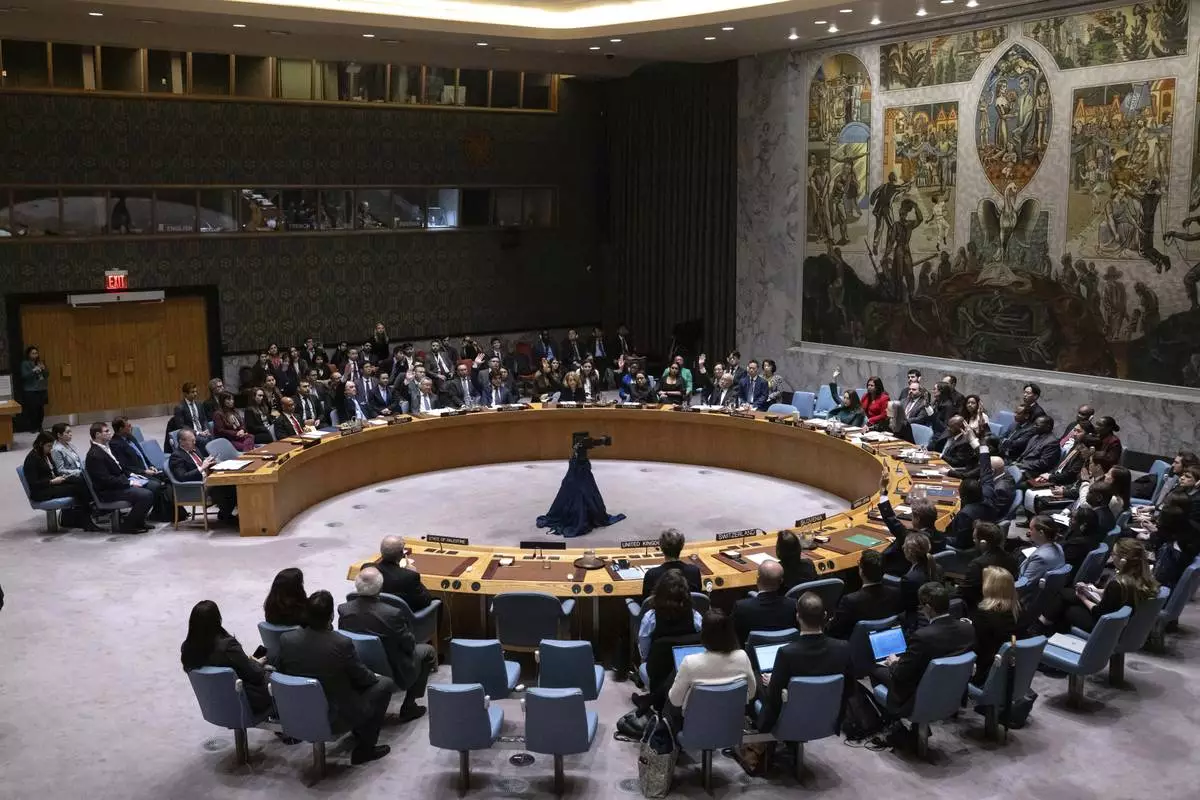
Representatives of member countries take votes during a Security Council meeting at United Nations headquarters, Thursday, April 18, 2024. (AP Photo/Yuki Iwamura)
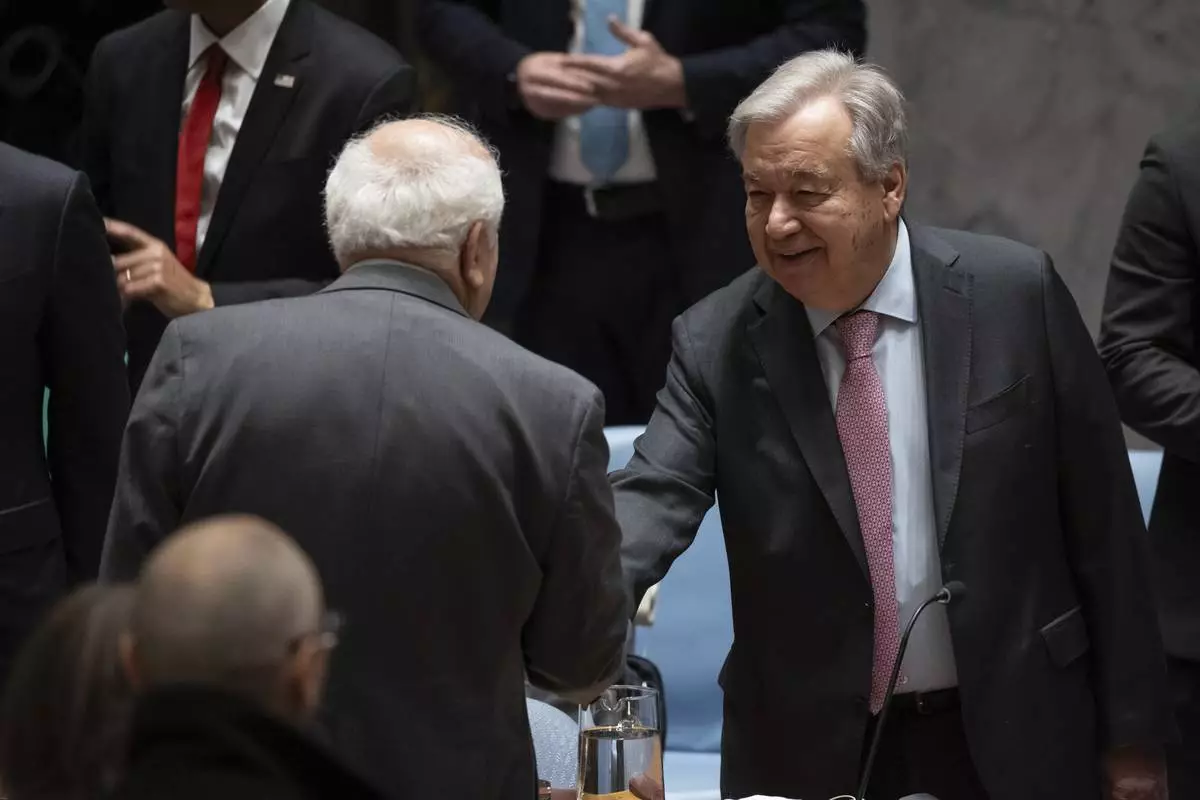
Palestinian Ambassador to the United Nations Riyad Mansour, left, and United Nations Secretary-General Antonio Guterres speak before a Security Council meeting at the United Nations headquarters, Thursday, April 18, 2024. (AP Photo/Yuki Iwamura)
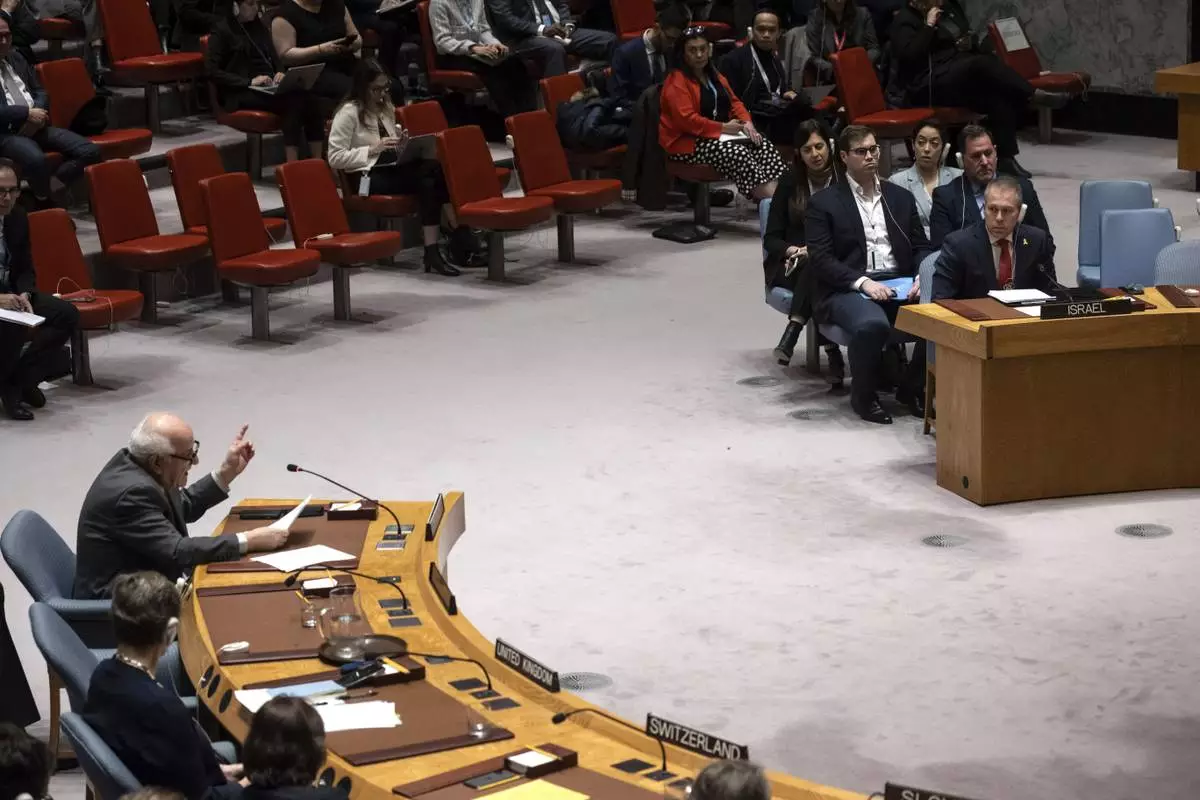
Palestinian Ambassador to the United Nations Riyad Mansour speaks during a Security Council meeting at United Nations headquarters, Thursday, April 18, 2024. (AP Photo/Yuki Iwamura)
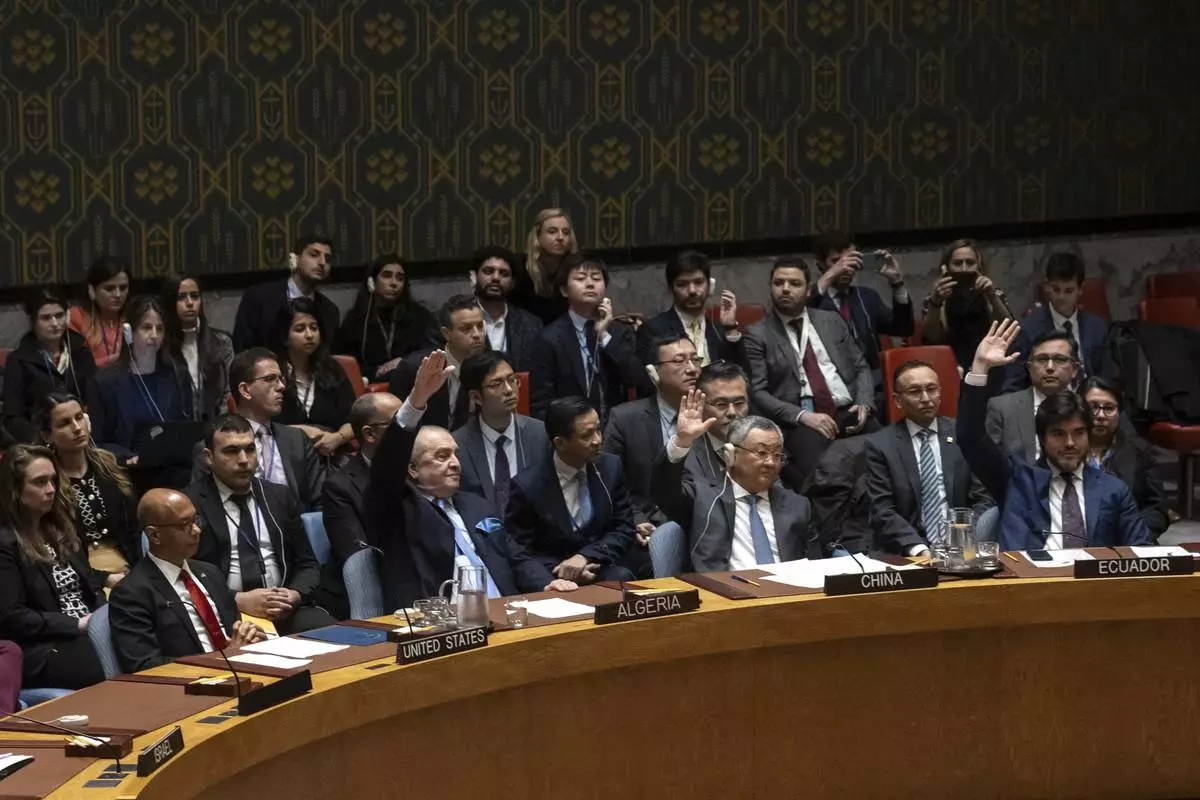
Representatives of member countries take votes during a Security Council meeting at United Nations headquarters, Thursday, April 18, 2024. (AP Photo/Yuki Iwamura)
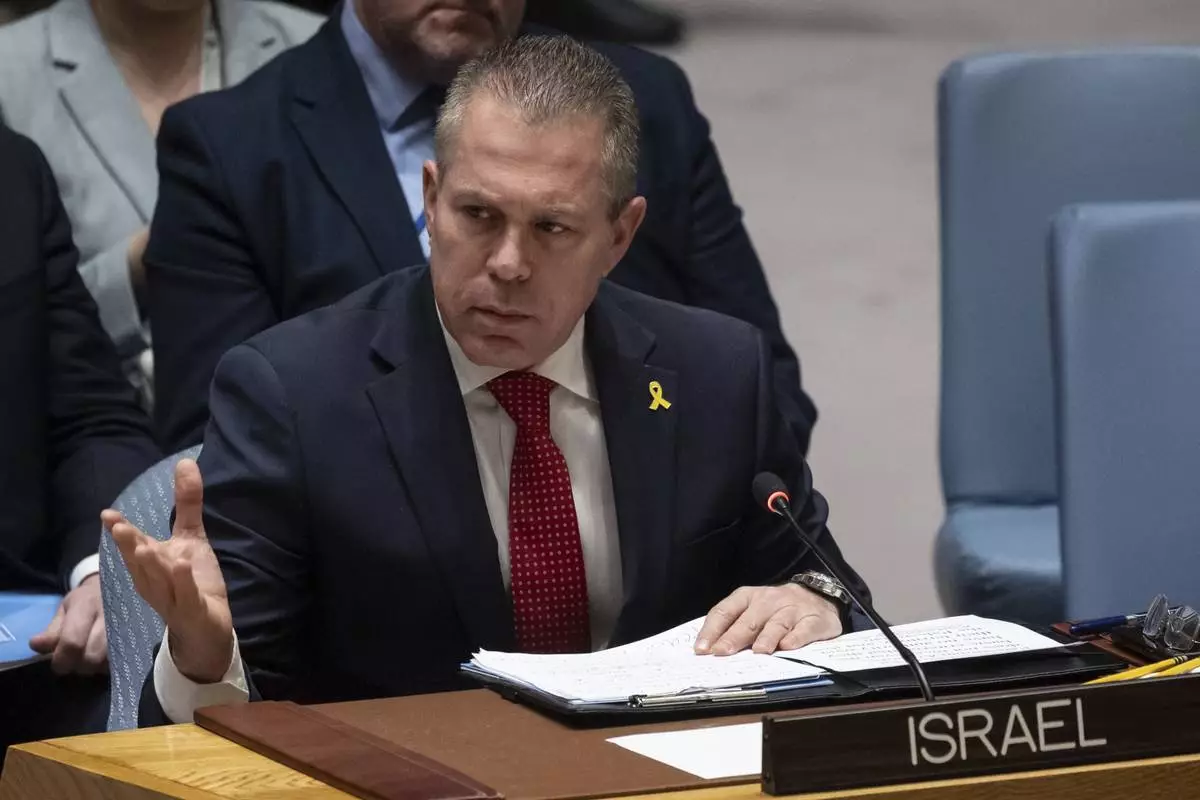
Israeli Ambassador to the United Nations Gilad Erdan speaks during a Security Council meeting at United Nations headquarters, Thursday, April 18, 2024. (AP Photo/Yuki Iwamura)
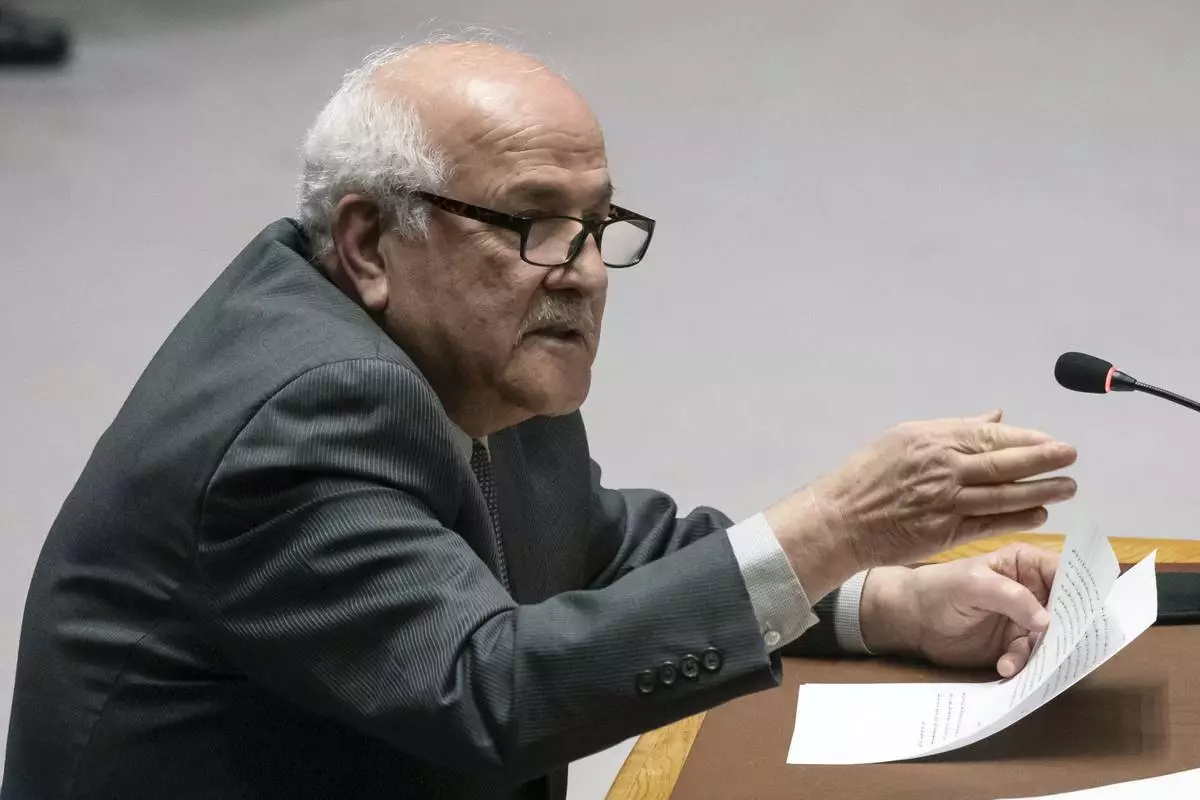
Palestinian Ambassador to the United Nations Riyad Mansour speaks during a Security Council meeting at United Nations headquarters, Thursday, April 18, 2024. (AP Photo/Yuki Iwamura)
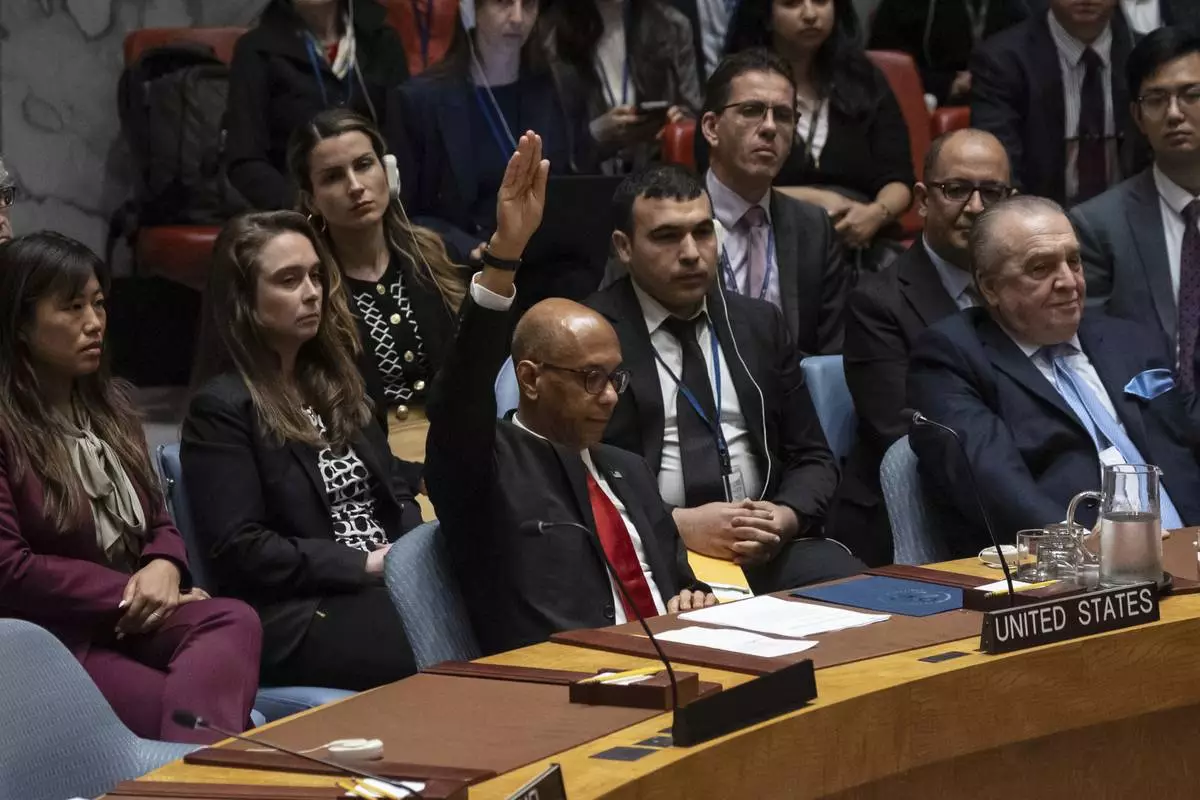
U.S. Deputy Ambassador Robert Wood votes against resolution during a Security Council meeting at United Nations headquarters, Thursday, April 18, 2024. (AP Photo/Yuki Iwamura)
















